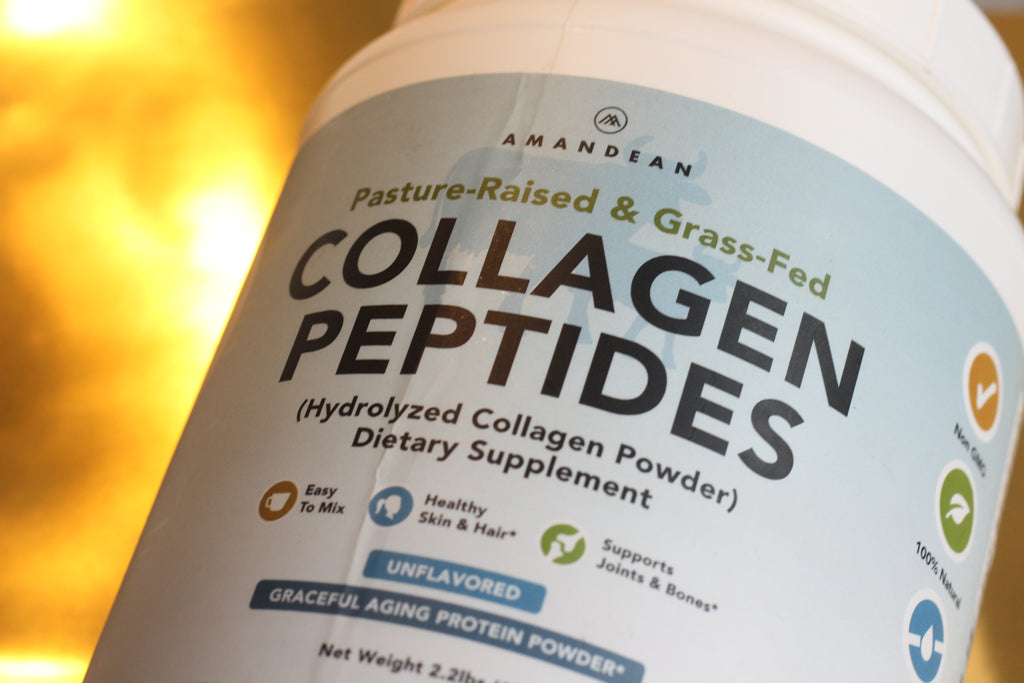Your Cart is Empty

November 09, 2020 5 min read
Take our quiz and find which supplements your body is craving.

Collagen is the most plentiful and impactful protein in the body. Collagen has many anti-aging benefits for your appearance and overall health. When your body has adequate amounts of collagen, your skin is healthy, bright, and youthful, your muscles are lean and strong, your hair is shiny, and the connective tissues in your body, like your joints, are healthy and flexible. Collagen truly is a foundational building block of the human body and is necessary for your mobility and overall well being.
Collagen molecules are made up of amino acids, primarily glycine, lysine, and proline. Glycine accounts for one-third of the amino acids in the collagen molecule. Lysine and proline constitute one-sixth of its amino acid content. Before being incorporated into the collagen strand, they are converted to hydroxylysine and hydroxyproline with the help of vitamin C. Once proline and lysine are converted, you have yourself a strand of collagen that can go to work throughout the body.

Over 30 different types of collagen can be found throughout the human body, and each has a vital role to play. However, types I and III make up the majority of the body's protein and are typically included in collagen supplements.
Despite its importance, as we age, our collagen production begins to decline. With this decline in collagen levels, your skin elasticity weakens causing wrinkles and fine lines, joint health begins to deteriorate causing stiffness and pain, and your gut health may worsen with it. This is why many people begin supplementing daily with collagen protein powder to try and boost their levels. Collagen peptides have been found to reduce wrinkles and increase skin health and hydration by boosting the production of collagen and elastin. It strengthens bones and inhibits bone breakdown as we age. It even helps to reduce recovery times due to joint and muscle injuries.
There are hundreds of collagen supplements on the market, each claiming to deliver universally effective benefits. The collagen found in supplements is sourced from animals, as there are no viable vegan options currently on the market. Bovine collagen is a popular type of collagen that is derived from the hides of cows. It is found naturally in bone broth and beef gelatin. Our bovine collagen comes from grass-fed cows in Paraguay, Uruguay, and Brazil, and closely mimics the collagen found in the human body, making it a popular choice. Another up and coming source of collagen is marine collagen. Marine collagen, also known as fish collagen, is extracted from fish skin.
There's also no need to worry about heavy metals contaminating marine collagen since metals are often stored in the fatty parts of the fish and collagen is sourced from fish skin. Not only that, marine collagen is a great sustainable and eco-friendly alternative as it uses the parts of the fish that are typically discarded in many fishing practices. Lucky for us, we know that’s where the good stuff is at! Marine collagen is keto, paleo, gluten-free, Bulletproof, and pescatarian-friendly, making it a great fit for many nutrition preferences. Both sources of collagen can be delivered in a liquid, pill, or powder form.
Now that you know why collagen has become such a popular supplement in the health and skincare worlds, it's time to discuss how to choose the best one! Many supplements' formulas don't take advantage of this protein's full potential, meaning they can't deliver the best results. When choosing a collagen supplement, here are some things to look out for to help you choose the best product:
1) Opt for powder over pills: Collagen peptide powders are the most effective and bioavailable method of supplementing your collagen levels. Powder can be easily digested to take effect much quicker. Additionally, it's much easier to add to liquids like coffee and tea or as part of your morning smoothie. Lastly, if you don’t like swallowing pills, a premium collagen powder will be your best friend.

2) Choose Hydrolyzed Collagen:Hydrolyzed marine collagen is collagen that is broken down into small protein chains, called marine collagen peptides, before it is used by the body. Hydrolyzation plays a huge factor in its bioavailability, or the amount that can be absorbed and used by the body. Whereas some collagen proteins can be too large and difficult to absorb, Amandean's Hydrolyzed Marine Collagen Peptides are hydrolyzed down to a 3000 dalton molecular weight, making it 1.5x more bioavailable and giving you a better bang for your buck.
3) Look for Marine Collagen sourced from Wild-Caught Fish:The majority of marine collagen powders on the market source their collagen from farmed fish. The issue with this is twofold: 1) Farmed fish easily spread diseases and are often given artificial hormones to keep them healthy. These contaminants then get passed onto you when you ingest the supplement. 2) This option is much less sustainable. Amandean's Marine Collagen Supplements are sustainably sourced 100% from wild-caught cod in the pristine waters of the North Atlantic. For those with shellfish allergies, finding a pure marine collagen supplement that’s sourced 100% from fish and contains no trace of shellfish is crucial! Not only does this ensure a pure and untainted protein, it's better for the planet and more ocean-friendly as well.
4) Steer clear of artificial flavorings:Sweeteners and artificial flavorings should not be needed in the first place. However, you are likely to see more and more flavored collagen powders on the market. Marine collagen is unflavored and odorless if it's pure and free of additives. Oftentimes artificial flavorings will be added to mask the taste or smell of a collagen powder that is tainted or contains impurities. When you choose the right marine collagen powder, there will be nothing to hide! Moreover, it won’t change the texture or taste of whatever drink or recipe you’re mixing it with.
5) Look for the Non-GMO Label:This ensures that you're ingesting a clean and natural product. If a supplement brand has invested in rigorous testing to ensure that their product contains no preservatives or genetically engineered ingredients, they'll display a non-GMO label on their product. You’ll also want to look for cGMP testing certification.

6) Pay attention to the recommended dose of collagen:Each individual's collagen needs are different, and your health history (especially if you suffer from a protein deficiency or diseases that attack the skin) can influence exactly how many grams of collagen you should take per day. As a general rule, your total proteindosage can be determined using your weight, exercise habits, and health history as a measure. However, if a brand's standard recommended daily dose exceeds ~10g, it's a red flag that the supplement is not bioavailable enough. Taking too much collagen can affect your digestion and cause bloating, so opt for highly effective, minimal dosage supplements!
A good way to know you’re on the right track when shopping for a marine collagen supplement is to remember that the lesser the number of the ingredients, the better. If you still have questions about marine collagen, our team at Amandean is here to help! You can also read through the supplement facts label on the back of the container for all your additional nutrition questions. For questions about using marine collagen for your unique needs, be sure to talk to your healthcare provider.

December 12, 2025 7 min read
Achieve luscious locks with collagen for hair. Try Amandean’s premium collagen supplements for stronger, healthier hair.

December 12, 2025 10 min read
Collagen packets by Amandean make skin, joint, and hair support easy on the go. Learn how collagen packets work and upgrade your wellness routine today.

October 17, 2025 8 min read
Find out why creatine is better for vegans! Boost your wellness game and unlock peak performance with Amandean's premium supplements today.